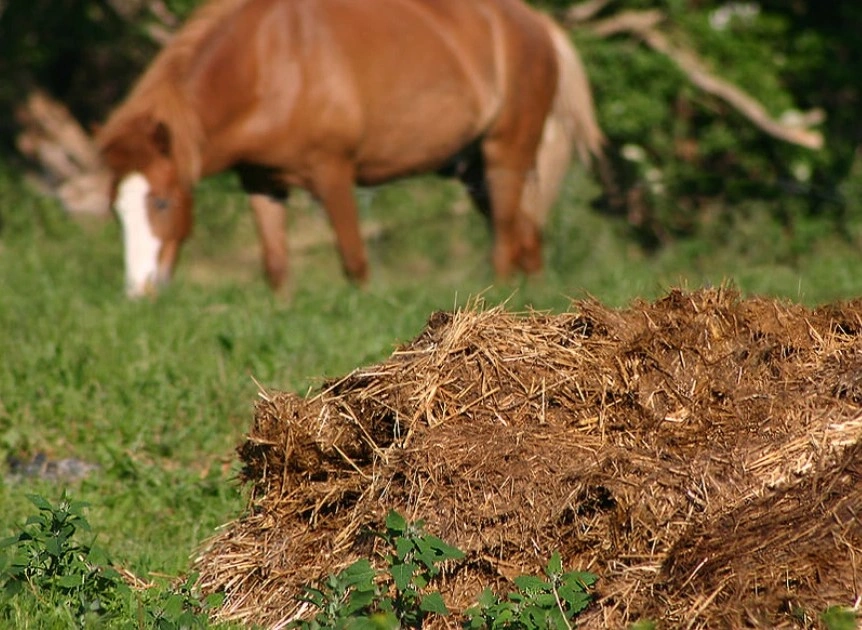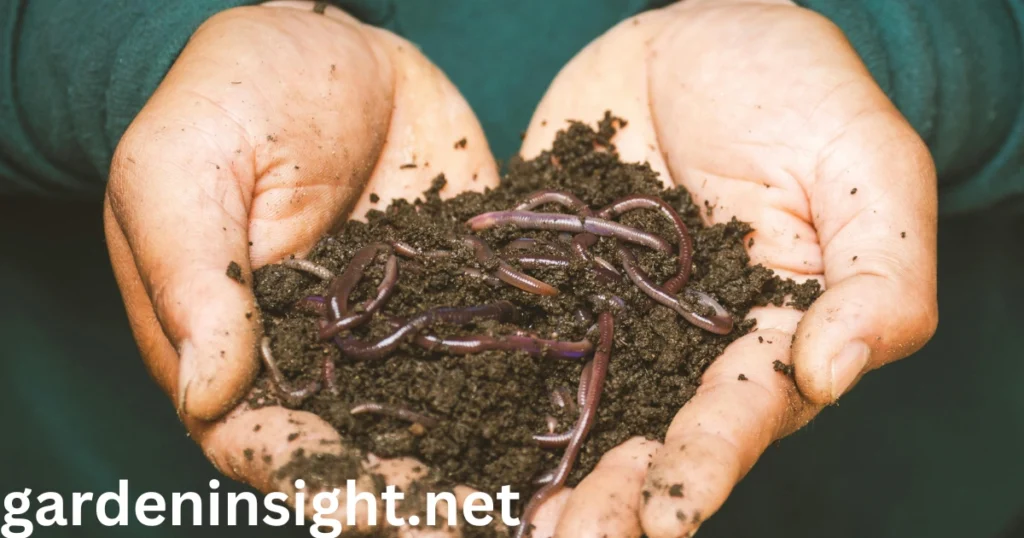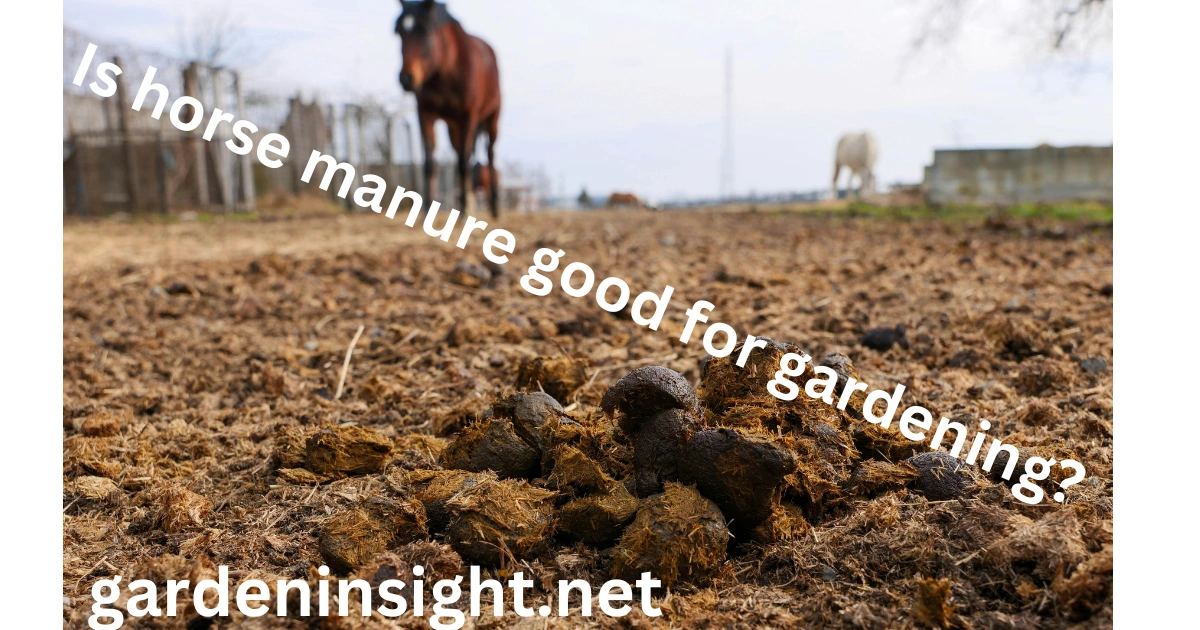Horse manure has been a popular soil amendment for centuries, and for good reason! It’s packed with nutrients that help plants grow strong and healthy. But is horse compost good for all gardens and all plants? Let’s dig in and find out.
Why Use Horse Manure in Your Garden?

Horse manure is a fantastic source of organic matter. As it breaks down, it improves soil structure, making it easier for roots to grow and access water and nutrients. It also adds beneficial microorganisms to the soil, creating a healthy environment for your plants.
Plus, horse poo contains essential nutrients like nitrogen, phosphorus, and potassium, which are vital for plant growth. Nitrogen encourages leafy growth, phosphorus supports root development and flowering, and potassium helps with overall plant health and disease resistance.
Is Horse Manure Good For Gardens
Horse manure is a fantastic addition to most gardens, offering a wealth of benefits for soil and plants alike. This natural fertilizer is packed with essential nutrients like nitrogen, phosphorus, and potassium, promoting robust growth and bountiful harvests.
Unlike synthetic fertilizers, horse manure also enhances soil structure. It improves drainage in clay soils, increases moisture retention in sandy soils, and boosts beneficial microbial activity in all soil types. Furthermore, as horse manure breaks down, it releases heat, providing a warm environment for seedlings and extending the growing season.
However, it’s crucial to use well-rotted manure to prevent burning plants and ensure weed seeds are no longer viable. With proper composting and application, horse manure can be a gardener’s best friend, contributing to a thriving and productive garden.
Plants That Love Horse Manure
Many plants thrive with a boost from stable fertilizer. Some of the biggest fans include:
- Heavy feeders: These are plants that require a lot of nutrients to grow well. Think of vegetables like tomatoes, peppers, corn, and pumpkins. They’ll gladly soak up the nutrients in horse compost and reward you with abundant harvests.
- Flowering plants: Roses, dahlias, and other flowering plants also benefit from the rich nutrients in horse manure, producing more vibrant and plentiful blooms.
- Fruit trees and bushes: Give your fruit trees and berry bushes a nutritious boost with horse compost. It can help them produce larger and tastier fruit.
| Plant Type | Loves Horse Manure | Why? | Hates Horse Manure | Why? |
|---|---|---|---|---|
| Hungry Plants (Heavy Feeders) | Tomatoes, Peppers, Corn, Pumpkins, Broccoli, Cabbage, Squash, Melons | These plants need lots of food to grow big and strong, like athletes needing lots of energy! Manure is like a super meal for them, packed with nutrients to help them grow large fruits and vegetables. | ||
| Flower Power | Roses, Dahlias, Sunflowers, Zinnias, Marigolds | Manure helps them make bigger, brighter, and more flowers! It’s like giving them a vitamin boost for beautiful blooms. | ||
| Fruitful Friends | Apple trees, Berry bushes (like raspberries, blueberries, and strawberries), Grape vines | Manure helps these plants grow tastier and juicier fruits. It’s like giving them a special drink that makes the fruit extra sweet! | ||
| Underground Growers (Root Vegetables) | Carrots, Potatoes, Beets, Radishes, Parsnips, Turnips | Manure can make their roots grow strangely, forked or bumpy, instead of smooth and straight. It’s like giving them the wrong instructions! They prefer soil that’s not too rich. | ||
| Sour Soil Lovers | Blueberries, Azaleas, Rhododendrons, Camellias, Ferns | These plants like their soil “sour” (acidic), like lemon juice. Manure makes the soil “sweet” (alkaline), like baking soda, which they don’t like. It can also make it hard for them to absorb the right nutrients. | ||
| Baby Plants | Seedlings of any kind, newly planted flowers or vegetables | Manure is too strong for their tiny roots, like giving a baby spicy food! They need gentle food until they’re bigger and stronger. |
What Plants Don’t Like Horse Manure
While many plants love horse compost, some prefer a lighter touch. Here are a few examples of plants that do not like horse compost:
- Root vegetables: Carrots, potatoes, and other root vegetables can become misshapen or develop forked roots if the soil has too much nitrogen, which can be abundant in fresh horse manure.
- Acid-loving plants: Plants like blueberries, azaleas, and rhododendrons prefer acidic soil. Stable fertilizer can make the soil more alkaline, which these plants don’t appreciate.
- Seedlings: Fresh horse compost can be too “hot” for young seedlings, burning their delicate roots. It’s best to use well-rotted manure or compost for seedlings.
Horse Manure Dangers
While generally beneficial, there are some potential dangers of horse manure to be aware of:
- Weed seeds: Horse manure often contains weed seeds that can quickly take over your garden. Composting the manure helps to kill many of these seeds.
- Burning plants: Fresh horse compost can generate heat as it decomposes, potentially burning plant roots. Always use well-rotted manure or compost, especially around young plants.
- Parasites and pathogens: Horse manure can sometimes harbor parasites and pathogens that can be harmful to humans and animals. Always wear gloves when handling manure and wash your hands thoroughly afterwards.
Is Horse Manure Acidic
Fresh horse manure is generally slightly alkaline, not acidic. This is due to the high levels of ammonia it contains. However, as horse manure decomposes, it gradually becomes more acidic.
The final pH of composted horse manure will depend on factors like the bedding material used (straw, for example, can increase acidity), the composting process, and any amendments added.
It’s always a good idea to test the pH of your composted manure before using it to ensure it’s suitable for your plants.
Is Horse Manure High in Nitrogen
While horse manure is a beneficial fertilizer, it’s not particularly high in nitrogen compared to other animal manures like chicken or bat guano.
The nitrogen content in horse manure varies depending on factors like the horse’s diet, bedding materials, and the composting process. Generally, it contains a moderate amount of nitrogen, along with valuable phosphorus and potassium.
This balanced nutrient profile makes it a good all-purpose fertilizer for a variety of garden plants. However, for nitrogen-loving plants like leafy greens, supplementing horse manure with a high-nitrogen fertilizer or compost may be necessary to achieve optimal growth.
How to Compost Horse Manure Fast

Composting horse manure is the best way to make it safe and beneficial for your garden. Here are some ways to compost stable fertilizer fast:
- Turn the pile regularly: Turning your compost pile introduces oxygen, which speeds up the decomposition process. Aim to turn it every week or two.
- Keep it moist: The compost pile should be damp but not soggy. Water it regularly if needed.
- Add high-nitrogen materials: Horse manure is already high in nitrogen, but adding other nitrogen-rich materials like grass clippings can help speed up the composting process.
- Use a compost accelerator: Compost accelerators contain beneficial microorganisms that help break down organic matter faster.
| Method | Description |
|---|---|
| Hot composting | Build a pile at least 3 feet wide and tall. Turn frequently to maintain high temperatures (130-160°F) which kill weed seeds and pathogens. This method can produce compost in 1-3 months. |
| Cold composting | Simply pile up the manure and let it decompose naturally. This method takes longer (6-12 months) but requires less effort. |
| Vermicomposting | Use worms to break down the manure. This method is faster than cold composting and produces nutrient-rich worm castings. |
Is Horse Manure Good For Vegetable Garden?
Horse manure is a boon for vegetable gardens, offering a wealth of benefits for healthy plant growth and bountiful harvests. This natural fertilizer delivers essential nutrients like nitrogen, phosphorus, and potassium, crucial for strong vegetables.
Moreover, it enhances soil structure, improving drainage in clay soils and increasing moisture retention in sandy soils, creating an ideal environment for vegetable roots to thrive. The addition of horse manure also boosts beneficial microbial activity in the soil, further promoting plant health.
While it’s a fantastic natural fertilizer, remember to use well-rotted manure to avoid burning plants and ensure any weed seeds are no longer viable.
With proper composting and application, horse manure can significantly contribute to a flourishing and productive vegetable garden, leading to an abundance of delicious and nutritious homegrown vegetables.
Is Horse Manure Good for Garden Beds?
Yes, horse manure is excellent for garden beds! It improves soil structure, adds nutrients, and helps retain moisture. Here’s how to use it:
- Well-rotted manure: Mix well-rotted poo from ponies into your garden beds before planting. This will provide a slow and steady release of nutrients throughout the growing season.
- Compost: Use finished horse manure compost as a top dressing for your garden beds. This will add nutrients and improve soil health.
- Mulch: Spread a layer of well-rotted horse compost around your plants as mulch. This will help suppress weeds, retain moisture, and add nutrients to the soil as it breaks down.
Conclusion
Horse manure is a valuable resource for gardeners. It can improve soil health, provide essential nutrients, and promote healthy plant growth. By understanding how to use it properly, you can harness the power of poo from ponies to create a thriving garden.
Remember to compost the manure before use, choose the right plants, and be mindful of potential risks. With a little care, you can enjoy the many benefits of this natural soil amendment.
FAQs
What Plants Grow Fast Utilizing Horse Manure?
Many plants grow quickly with the help of horse compost. Leafy greens like lettuce and spinach, as well as fast-growing vegetables like zucchini and cucumbers, respond particularly well to the nutrients in horse manure.
Can I Use Fresh Horse Manure in My Garden?
It’s best to avoid using fresh horse manure in your garden. It can burn plants and may contain weed seeds and pathogens. Always compost stable fertilizer before using it.
How Long Does it Take for Horse Manure to Decompose?
The time it takes for stable fertilizer to decompose depends on factors like the composting method, temperature, and moisture levels. It can take anywhere from a few months to a year or more.
Is Horse Manure Better Than Cow Manure for Gardens?
Both horse compost and cow manure are beneficial for gardens, but they have slightly different properties. Horse manure is generally hotter and decomposes faster than cow manure. Cow manure is cooler and better for heavy clay soils. The best choice for your garden depends on your specific needs.
Where Can I Get Horse Manure for My Garden?
You can often find poo from ponies for free or at a low cost from local stables, farms, or riding schools. Make sure to ask about the horses’ diet and any medications they may be taking, as this can affect the quality of the manure.
